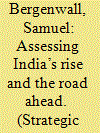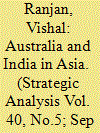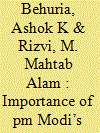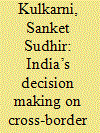|
|
|
Sort Order |
|
|
|
Items / Page
|
|
|
|
|
|
|
| Srl | Item |
| 1 |
ID:
147218


|
|
|
|
|
| Summary/Abstract |
The concept of ‘Vivir Bien´ or ´Good Life’ has emerged in Bolivia’s political, policy and diplomatic discourse after the ascension to power of Evo Morales in December 2005, the first person of indigenous ethnicity to be President of Bolivia. In South Asia and other parts of the world much is known about Bhutan’s Index of Happiness, but little is heard about ‘Vivir Bien’ or ‘Good Life’, the ideology of Life, Politics and Diplomacy emanating from Bolivia, in the heart of Latin America. ‘Good Life’, now the core of Bolivian polity, arises from the Andean Cosmovision which places Nature at the centre of Life and the need to maintain balance and harmony in one’s interaction with Mother Nature. Bolivia is attempting to put back on centre stage the original peoples of the land—the Aymara, the Qechua and the Guarani—and their ancient yet timeless wisdom of Life in Harmony with Nature.
|
|
|
|
|
|
|
|
|
|
|
|
|
|
|
|
| 2 |
ID:
147215


|
|
|
|
|
| Summary/Abstract |
This article analyses India’s economic, military and political rise in the international state system. It concludes that India is on the rise in all three power dimensions, underpinned by a larger share of global GDP. However, it also identifies the constraints on the way. On matters concerning its economy, India lags behind in industrial prowess, innovation, socio-economic development and financial strength. While modernising its defence capabilities, it faces obstacles due to budget issues, institutional constraints and a weak defence industry. At the global level, its political leverage is circumscribed by its small diplomatic corps, limited foreign aid, underutilised soft power assets and by an immediate neighbourhood that consumes much of its political energy. India’s rise could also be delayed by various domestic constraints as well as failure to adapt to ‘the second machine age’ and ‘the return of geopolitics’. Nevertheless, the probabilities of India’s continued rise in the international system are good, given its favourable demographics and catch-up opportunities related to labour productivity, urbanisation and digitisation.
|
|
|
|
|
|
|
|
|
|
|
|
|
|
|
|
| 3 |
ID:
147217


|
|
|
|
|
| Summary/Abstract |
The recent Australian decision to extend civilian nuclear cooperation to India, overriding its own long-term principled position, is no ordinary development. Taking that as a starting point, this article seeks to set out the context and rationale for an all-round and long-term closer relationship between the two countries. Arguing that such an Australian decision is not just a one-off gesture, but instead, it forms the basis for deeper strategic engagement, this article advances that the emergence of the concept of ‘Indo-Pacific’ is part of a shared strategic vision between the two, with the Indian Ocean constituting the cornerstone of their common security policy. In view of India lately revisiting its fundamental foreign policy assumptions in an imaginative manner, the US ‘pivot’ coupled with the intermittent projection of a ‘democratic quadrangle’—also inclusive of Japan and the US—lends further gravitas to this growing bilateral dynamic.
|
|
|
|
|
|
|
|
|
|
|
|
|
|
|
|
| 4 |
ID:
147209


|
|
|
| 5 |
ID:
147211


|
|
|
|
|
| Summary/Abstract |
Prime Minister Narendra Modi’s visit to Iran is important in many ways. It came at a time when India is seriously contemplating activation of its ‘Look West’ policy and banking on Iran as a ‘gateway’ and provider of a corridor to Central Asia and Afghanistan. The visit sought to revitalise India–Iran bilateral relations which has passed through an uncertain phase during the last decade.
|
|
|
|
|
|
|
|
|
|
|
|
|
|
|
|
| 6 |
ID:
147216


|
|
|
|
|
| Summary/Abstract |
In the last two decades, cross-border gas pipelines have become an integral part of discourse on India’s energy security. Successive reports from the government and the private sector have envisaged an important role for cross-border gas pipeline projects in India. After engaging in negotiations for several years, the Indian Government finally joined the Turkmenistan, Afghanistan, Pakistan and India (TAPI) gas pipeline over the Iran–Pakistan–India pipeline (IPI) and the Myanmar–Bangladesh–India pipeline (MBI). Several critics of this project have questioned this decision of the Indian Government to join TAPI due to the huge levels of risks involved and the project’s commercial unviability. The article is an attempt to understand the decision-making process of the Indian Government on cross-border gas pipeline projects and its rationale for choosing a seemingly riskier project like the TAPI pipeline and letting go of the other two pipeline projects. The article makes an attempt to conduct a detailed discussion around such factors that contributed to India’s decision making on these projects.
|
|
|
|
|
|
|
|
|
|
|
|
|
|
|
|
| 7 |
ID:
147210


|
|
|
|
|
| Summary/Abstract |
India’s current Prime Minister Narendra Modi is often touted as India’s Deng Xiaoping, expected to lead the country on a path of economic reform and accelerated growth.11. Afshin Molavi, ‘Narendra Modi Must Do for India What Deng Xioping Did for China’, The National, September 6, 2014, at http://www.thenational.ae/opinion/comment/narendra-modi-must-do-for-india-what-deng-xiaoping-did-for-china#full (Accessed October 12, 2015).View all notes While Modi rose to power on an economic mandate, it is his foreign policy that has received the most attention in the media. Modi has been criticised by the media, the public and the opposition parties for taking several overseas trips in his short tenure in office. Visiting 19 countries in his first year in office (including state visits and multilateral institutional meetings) for a total of 33 as Prime Minister, Modi intends to engage India’s neighbours and strengthen regional ties while simultaneously rejuvenating and strengthening India’s relations with great powers such as Russia and the United States.
|
|
|
|
|
|
|
|
|
|
|
|
|
|
|
|
| 8 |
ID:
147214


|
|
|
|
|
| Summary/Abstract |
Xi Jinping became the General Secretary of the Communist Party of China in November 2012 and the President of the People’s Republic of China in March 2013. Ever since, under his leadership as the Chinese President, the Chinese Communist Party (CCP) has been progressively tightening its control over the media. In a Communist structure, the media is perceived to be the ‘mouthpiece’ of the Party and is supposed to be used for propaganda. Media is a very essential tool in spreading the government agenda and controlling the public discourse. In fact, the CCP had established the Department of Propaganda as early as in the year 1920.11. Erping Zhang, ‘Sars: Unmasking Censorship In China’, China Rights Forum, Seeds of Change, No. 3, 2003, p. 46, at http://www.hrichina.org/sites/default/files/PDFs/CRF.3.2003/Erping_Zhang.pdf (Accessed February 20, 2013).View all notes As David Bandurski put it, ‘press control is an essential element of political life in China and it is also real and immediate.’22. David Bandurski, ‘Jousting with Monsters: Journalists in a Rapidly Changing China’, in Timothy B. Weston and Lionel M. Jensen (eds.),China in and beyondtheHeadlines, Rowman & Littlefield, Lanham, MD, 2012, p. 29.View all notes Xi has taken the cue from his predecessors and has in fact gone past them to impose new controls over an already tame media in the name of strengthening the ideas of ‘peace and stability’ in Chinese society.
|
|
|
|
|
|
|
|
|
|
|
|
|
|
|
|
| 9 |
ID:
147212


|
|
|
|
|
| Summary/Abstract |
A number of factors led to the fall in the price of oil. First, the shale revolution in the US, which not only saw production growing but US oil and gas imports falling, freeing up supplies originally destined for the US market. This led to the initial glut in supply. With the US then exploring options of becoming a net exporter to shore up domestic prices and keep the taps running, the traditional oil exporters started pushing up their production in order to retain and expand their market share, even offering discounted prices in some cases. While this has served to wipe out the extra barrels that could be brought in at short notice—mainly by Saudi Arabia—it has also led to an oversupplied oil market.
|
|
|
|
|
|
|
|
|
|
|
|
|
|
|
|
| 10 |
ID:
147213


|
|
|
|
|
| Summary/Abstract |
A watershed moment for nuclear security was reached when global leaders from more than 50 countries including India and other organisations met successively over six years (2010–2016) to develop an effective and sustainable plan for global nuclear security. At the end of six years, much has been accomplished to improve and upgrade nuclear security in several countries. Despite this perseverance, threats to nuclear security still remain undiminished, primarily because wrong people nursing a malicious agenda desire nuclear and radiological materials.
|
|
|
|
|
|
|
|
|
|
|
|
|
|
|
|
|
|
|
|
|